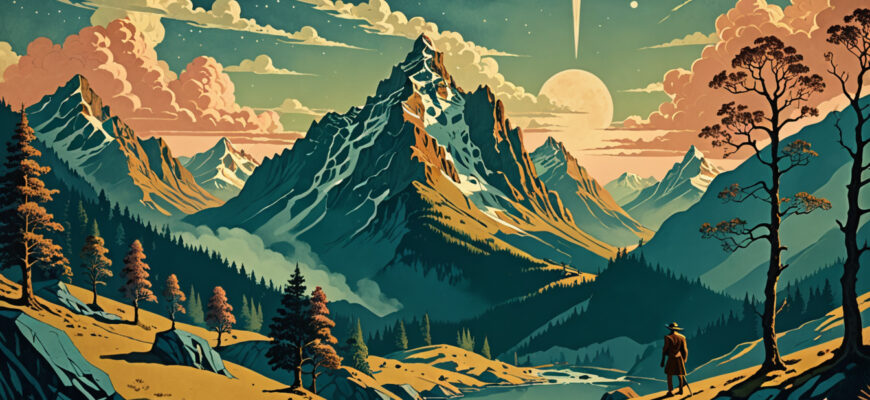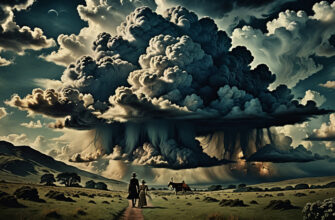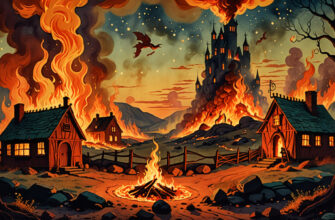You wake up breathing hard. Your legs ache like you’ve sprinted, but you haven’t moved. In the dream, you were climbing a mountain—steep, endless, and silent. Or maybe you just stood there, stuck at the base, unable to take the first step. Either way, the mountain showed up, and that means something’s stirring beneath the surface.
Mountain dreams aren’t just about wild landscapes or scenic views. They drag up buried ambition, old wounds, desire, exhaustion—the mess and beauty of being human. Some nights, that mountain is something you want: success, love, healing. Other nights, it’s what you fear: falling, failing, being seen. Either way, it’s you versus gravity, with no one watching but your inner demons.
This isn’t surface-level symbolism. This is deep terrain—especially if you’re someone who feels things hard. Whether you’re chasing a goal, grieving, or burnt out and just pretending you’re okay, mountain dreams show up when some part of you is trying to rise.
So let’s strip this down. No woo-woo. No sugarcoating. Just straight-up emotional honesty about what your mountain dream is really trying to say.
- Emotional Topography: The Mountain As Metaphor
- A Mirror, Not A Map
- Who Dreams Of Mountains?
- Climbing Toward Something (Or Away From Yourself)
- Falling Off Or Slipping Down
- Frozen At The Base
- The Mountain and the Body: Erotic Symbols, Repression & Sexual Power
- Mountains as Erotic Imagery
- Dream Terrain as Sexual Repression
- Arousal and Anxiety: When Desire Feels Dangerous
- Psychological Interpretation Through a Trauma-Informed Lens
- PTSD Echoes
- Spiritual Numbness and Emotional Calluses
- Childhood Programming & Parental Patterns
- How to Use These Dreams For Healing and Change
- Start Translating Your Nighttime Signals
- Ask: What Am I Climbing Toward?
- Let the Mountain Be a Mirror, Not a Monster
Emotional Topography: The Mountain As Metaphor
Think of dream mountains as psychological GPS. They don’t tell you where to go, but they show exactly how hard the trip feels. Climbing a mountain in sleep often reflects how freaking exhausting it is to keep pushing in waking life—toward healing, success, love, or self-respect. It’s ambition, yes, but it’s also struggle.
A steep, icy slope? That’s your burnout. A pile of crumbling rocks? Maybe shame you’re trying to sidestep. The harder it is to climb, the more energy some part of you is pouring into Just. Holding. It. Together.
And then there’s transformation—the grittiest kind. As you ascend in the dream, you’re becoming someone different. It’s growth with blisters, not fireworks. Every obstacle is a truth you haven’t faced, every turning point a chance to keep going even when it’s dark and steep.
A Mirror, Not A Map
Dreaming of mountains doesn’t mean you’re being shown what to do—it’s more like getting handed a mirror to your insides. If the path is shattered or foggy, maybe your inner world is chaotic or unclear. If you fall or freeze, that might be trauma cracking through the calm you’ve faked all day.
These dreams come up when something inside is too loud to ignore: the pain you buried, the part of yourself you’re still ashamed of, that chapter you never finished writing. The mountain reflects those jagged edges and hidden climbs you haven’t dared to speak out loud yet.
Who Dreams Of Mountains?
If mountain dreams show up more than once, it’s not random. There’s a pattern:
- Grief-holders: still carrying the weight of someone or something gone.
- Control seekers: scared of letting go, addicted to the climb.
- Spiritually exhausted: searching for meaning after burning out their soul.
- Romantically bruised: still bleeding from a love that crashed hard.
It’s not a coincidence. The mountain meets you when you’re cracked open, when part of you wants to avoid the climb and another part is already halfway up.
Climbing Toward Something (Or Away From Yourself)
In dreams, climbing a mountain can feel like both a race toward transformation and an escape from who you used to be. But the body doesn’t lie—if you’re struggling to climb:
- Burnout is real: Your mind might be trying, but your soul is screaming to rest.
- Perfectionism is deadly: When every step has to be flawless, you stop moving.
- Someone else’s dream? If you’re chasing a success that doesn’t even feel like yours, your subconscious knows.
And what happens when you actually reach the peak? Relief, maybe. A brief moment of “I did it.” But often it comes bundled with fear—the kind that creeps in right after you get what you wanted. Now that you’re up high, what if you fall? The summit can feel like a heartbreak waiting to happen.
Falling Off Or Slipping Down
Falling dreams have their own brand of terror, especially when it’s from a mountain. Slipping mid-climb or tumbling off the edge often steams from some mix of:
– Self-doubt eating away at your confidence.
– Anxiety that you’re faking it and someone’s about to find out (hello, imposter syndrome).
– Pressure that’s built too high, and now your mind’s screaming for safety.
If the fall isn’t your fault—if you get pushed—it’s a whole different tone. That’s betrayal in your bones. You may still be carrying the sting from someone who shoved you down when you trusted them to be at your side.
Frozen At The Base
Sometimes you’re not climbing or falling. You’re just there—standing at the base. Stuck. Paralyzed. The mountain towers over you, and your feet won’t move.
That kind of dream isn’t failure. It’s fear dressed as stillness. Maybe you’re overwhelmed by the weight of starting again. Maybe transformation feels too risky right now. Or maybe your body knows that change only works when you’re ready—and this pause is your mind gathering power before the first step.
| Dream Symbol | What It Might Represent |
|---|---|
| Cliff | A huge decision, or point of no return |
| Crumbled Path | Lack of direction, fear of getting lost |
| Hidden Summit | Goals that feel impossible or unclear |
| Dark Clouds | Anxiety, depressive episodes, or confusion |
The Mountain and the Body: Erotic Symbols, Repression & Sexual Power
Mountains as Erotic Imagery
Ever had a dream where you were breathless, halfway up a peak, feeling pressure mount with every step—and woke up flushed? Mountains in dreams can double as raw metaphors for sexual tension. Evening climbs in the subconscious sometimes mirror yearning from waking life: desires unmet, touches denied, bodies craving something tender or wild.
That climb, that summit—it’s not just about achievements. Peaks are climax points. And in dreams, especially during dry spells or lonely nights, these images sneak in as code. They can mean your body wants to let go, to feel again. Even more so when the mountain transforms mid-dream—into a lover, a challenge, or a chase.
Dream Terrain as Sexual Repression
Slipping halfway. Falling before the top. Repeating the same climb, never reaching the peak. These aren’t just failed missions—they’re confessions from your sleeping mind. Many people recovering from shame-based conditioning, body guilt, or sexual trauma experience mountain dreams that stall right before the crest.
In some trauma survivors, these dreams show up like internal blockades. Some can’t even begin to climb, standing still in tight gear, staring upward but frozen. That halt? It’s not weakness. It’s a scar disguising itself as self-protection.
Arousal and Anxiety: When Desire Feels Dangerous
Sexual energy doesn’t disappear. When ignored, it morphs—spilling into dream symbols, especially when it’s repressed or tangled in past hurt. Mountain terrain—jagged, unpredictable—shows up in people choosing celibacy, recovering from miscarriages, or carrying IVF grief.
Sometimes it’s not a mountain someone climbs. Sometimes it’s a peak that crashes down before they get there. Those dreams aren’t dirty. They’re sacred. They’re the body remembering what’s been lost—and what it still wants.
Psychological Interpretation Through a Trauma-Informed Lens
PTSD Echoes
Nightmares of snowy cliffs, sudden rockslides, or standing exposed on a freezing peak—these can be PTSD-coded dreams. Harsh mountain conditions reflect emotional flashbacks. Survivors often dream of thin oxygen, impossible climbs, or falling off ledges at the exact moment they feel powerless during waking hours.
These visuals are more than just bad dreams. They’re your nervous system processing threats that still live in your body. Avalanche imagery? Sometimes grief that never got spoken. Sudden drops? The raw panic of unpredictability after trauma.
Spiritual Numbness and Emotional Calluses
A dream of a gray, cracked mountaintop with lifeless air can signal something deeper than exhaustion. It’s about losing touch—with joy, with meaning, with yourself. This kind of dream doesn’t hit with terror. It hits with nothing. That’s how numbness works.
In people silently burning out or walking around emotionally shut down, this terrain shows up like a warning flare. The dream isn’t saying you’re broken. It’s whispering that you’ve gone cold—and to warm up before you forget how.
Childhood Programming & Parental Patterns
If you’ve been dreaming about the same mountain since you were a kid, that’s not random. Especially if you’re always stuck in the same place—trying to climb, getting scolded, or carrying someone else’s load. These repeated patterns often trace back to family dynamics or early shame around goals, failure, or being “too much.”
The mountain grows with you—but so does what you still haven’t let go of.
How to Use These Dreams For Healing and Change
Start Translating Your Nighttime Signals
- Keep a dream journal. No editing, no overthinking.
- Highlight how the mountain felt—was it cold? Crowded? Silent?
- Circle any emotions you felt during the climb or fall—those are your clues.
Your dreams won’t spell it out, but they’ll give you plenty of signs.
Ask: What Am I Climbing Toward?
Let your dream mountain be more than metaphor—it can be your mirror. Are you chasing someone’s approval? Running from your own needs? Climbing only because you think suffering equals worth? Sit with that.
Mountains don’t lie. You’re already carrying the truth in your body.
Let the Mountain Be a Mirror, Not a Monster
Tough dreams aren’t punishments. They’re raw love letters from deep inside. Reframe the fear. When the mountain looks too big, maybe that’s because you’ve finally outgrown small goals. Let the dream show you where the hunger is—and go there.
Every fall’s a story. But climbing again? That’s healing.








